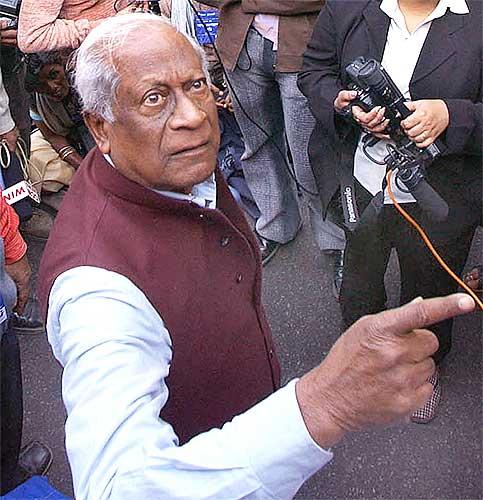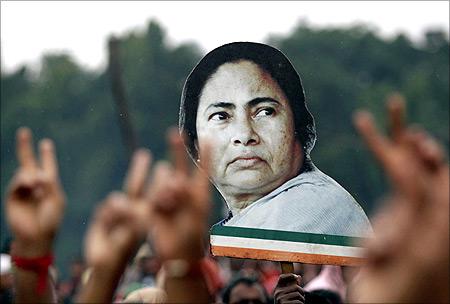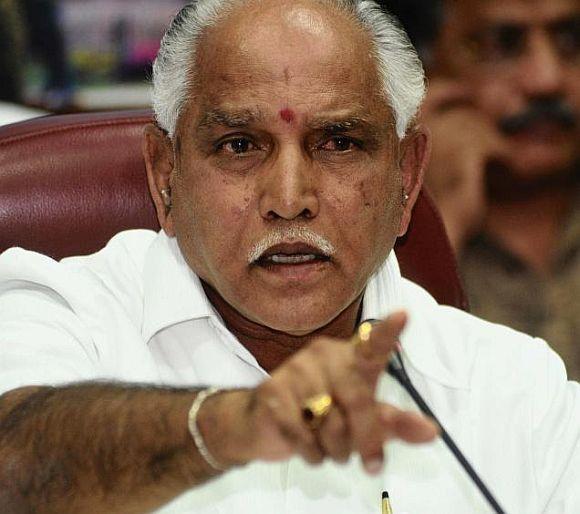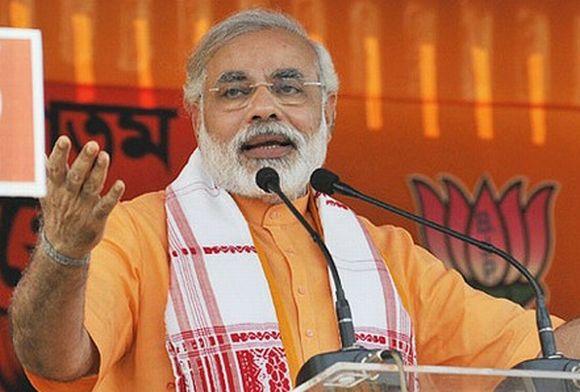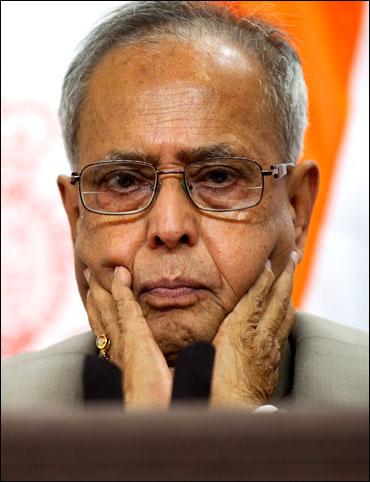 | « Back to article | Print this article |
'2014 will be a challenging time for any President'
I have no doubt that in 2014 there will be objective conditions for the Left to take initiatives and have a voice, says former general secretary of the Communist Party of India A B Bardhan. He spoke to Neerja Chowdhury.
The 2012 Presidential poll has divided every political formation right down the middle, but what came as a surprise was that it split the Left parties also. The CPI (Communist Party of India) has decided to abstain in the July 19 vote, while its bigger brother, the CPM (Communist Party of India - Marxists), took the unusual step of voting for the United Progressive Alliance's Presidential candidate Pranab Mukherjee.
The CPM too was divided, and it seems the politburo was divided eight versus seven, with Prakash Karat (CPM general secretary) outvoted and the Bengal group having its way. This move has brought the CPM one step closer to the Congress and may not only have a bearing on the stability of the UPA government, but also on the lineup in 2014.
The following is an excerpt from an interview with 87-year-old CPI veteran AB Bardhan, who has had a long political innings, and understands the inner workings of Left politics.
Click NEXT to read further...
'Mamata cannot vote for Sangma and be seen standing with BJP'
You batted for Pranab Mukherjee for President in 2007 but this time he has divided the Left and your party has decided to abstain in the poll. The CPM has, however, decided to vote for him, probably mindful of the Bengali sentiment that prevails in West Bengal?
Pranab Mukherjeeis not like BC Roy or Jyoti Basu (former chief ministers of West Bengal), who did a lot for Bengal, even if you talk about the Bengal angle. You are saying that just because he happens to be from Bengal, Bengal should vote for him, like 'amra Bangali'. I am a Bengali and I am not enthusiastic about Pranab Mukherjee.
But the Left wanted him as President in 2007?
In 2007, it was a name that came out suddenly from Sitaram Yechury (CPM leader). It was shot down immediately by Madam Gandhi (Sonia Gandhi). Who will look after the government? she had asked.
He has been looking after the government since then. Later, when I had told Pranab what had transpired at the meeting -- there were four of us from the Left parties along with Manmohan Singh and Sonia Gandhi at the meeting -- and what Sonia Gandhi had said about him running the government, even though the prime minister was present, he had remarked, "she didn't think of that when naming the PM".
This time, Pranab Mukherjee has divided the Left also right down the middle?
We have all agreed that (despite differences) the Left Front continues. Even now a meeting is going on to fix a date for the agitation on food security. We are planning a joint struggle.
Prakash Karat had said that the CPM's decision to vote for Pranab Mukherjee will divide the Congress and the Trinamool, and that it would not be proper if both the CPM and the Trinamool abstain. What do you think Mamata will do?
Mamata has said she will announce her decision three days before polling. They have now said -- it has been attributed to Trinamool sources -- they will not abstain. She cannot vote for Sangma and seen to be standing with the BJP (Bharatiya Janata Party).
I am sure Pranab Mukherjee will meet her, and the PM will give her assurances that they will do their best for West Bengal.
What happens to the CPM's stand if Mamata decides to vote for Pranab?
That is the question. You may get a third letter from (expelled CPM leader) Prasenjit Bose!
Click NEXT to read further...
'Karnataka models what the BJP is today'
With Pranab Mukherjee out of the finance ministry the prime minister is suddenly smiling, with no one there to rein him in...
All these four people at the top -- PM, Montek Singh Ahluwalia (deputy chairman of the Planning Commission), P Chidambaram and Pranab Mukherjee -- were sold on neo-liberal policies, but with one difference. Pranab, called to implement these policies as finance minister, came to realise that there was people's opposition to implementing them. He is more pragmatic than the others. The PM does not have to face the people or get elected and this is his last term, which he has to complete. Montek is a bureaucrat with nothing to do with people. Even Chidambaram, he would have thought many times.
What kind of President, do you think, Pranab Mukherjee will make?
The year 2014 will be a challenging time for any President, and Pranab Mukherjee will be a proper President (for that time). I don't think he will automatically call the Congress (to form the government).
We have had many kinds of Presidents. Shankar Dayal Sharma had spoken out against the Babri demolition, when the then prime minister did not utter a (on the subject). KR Narayanan also similarly spoke up on issues on two occasions. So did Rajendra Prasad; he thought himself equal in stature to Jawaharlal Nehru.
Our politics is in a state of flux. The Congress has been declining on one hand, and there is the possibility of Narendra Modi being projected on the BJP's side -- provided he wins in Gujarat. On the other side, Nitish Kumar is ready to come out of the NDA, if that happens. The regional parties are growing stronger. How do you see this scenario developing?
I don't see the Congress, even under the cover of the UPA, doing well. The situation of the BJP is even worse. Karnataka models what the BJP is today -- the party 'with a difference', and that "difference" can be seen in the drama and melodrama that has taken place in the last four years, and three CMs have come and gone.
Even if you add the vote of the UPA and the BJP (in 2014), it would be less than 50 per cent. Yet, a political vacuum is not going to be there. All the other parties will have a role to play. In this atmosphere, the Left will definitely have a role.
It is said that Nitish Kumar, for instance, is in close touch with Mamata Banerjee and if she is part of any grouping, the Left will be out of it, which could leave you isolated?
You are over estimating her. Her behaviour -- her actual functioning -- is a question mark for others.
Click NEXT to read further...
'The past has no relevance today'
What about Modi?
There are five existing prime ministerial candidates in the BJP. Modi has response only in Gujarat, also because he has terrorised Gujarat. He has no acceptance outside Gujarat. That is why Nitish is using the argument -- let the BJP have a secular face for its PM candidate.
I am in constant touch with Sharad Yadav (Janata Dal-United leader), who constantly says that he will not allow Modi as PM.
There has been a rash of memoirs recently, by Dr APJ Abdul Kalam, the late Congress leader Arjun Singh and by Kuldip Nayar. Nayar has said that PV Narasimha Rao was doing pooja while the Babri Masjid came down on Dec 6, 1992. How do you see the relevance of these books?
All these people, in their relative senility, are trying to recall things of their past, and that past has no relevance today.
Surely these events are relevant because they throw light on how decisions came to be made at the top. If the PM of the country was otherwise engaged, and the Indian state failed to protect the Babri Masjid.
We had heard that Narasimha Rao was sleeping that afternoon. So? The BJP will not be able to live that down. Like Banquo's ghost it will come up again and again.
Kalam has also revealed that he would have had no option Constitutionally but to call Sonia Gandhi to takeover as PM had she staked her claim to form the government in 2004. Where as there has been speculation that it was he who had prevented her from staking her claim ...
What is the point of Kalam saying it now, though, according to me, he is speaking the truth. We knew then that he had raised no questions about her foreign origin. And by admitting the truth, he has harmed his reputation. His reputation was based on the premise that he could speak to her like that and that he had stopped her from becoming prime minister. That was not the case. Why is he saying it now? What does he want to prove?
He has also expressed his mystification that the UPA took three days to stake its claim to form government?
For three days, no claim was made because the UPA had to settle things. The UPA was unanimous on Sonia Gandhi's leadership. It had to meet twice, first to elect her and then again when she turned it down.
As I said, all these persons are trying to look at the present from the point of view of their past.
Click NEXT to read further...
'Differences with UPA started with signing of Indo-US Defence Agreement'
How would you contrast the Left's relationship with UPA I and Mamata Banerjee's relationship with UPA II, for she is also shooting down policy proposals like you did?
We fought on policies. If you remember, our "outside" support to the UPA was not unconditional, but was based on a common minimum programme. If you compare the original document(of the CMP) with the final one that emerged, there were a lot of changes, and we had brought these about, elaborating on policy issues, like no privatisation of profit earning PSUs.
I remember Pranab Mukherjee had joked at the time that who would want to purchase the PSUs which were not profit earning. We had also insisted on the Right To Information, Forest Rights bill, Nrega (National Rural Employment Guarantee Act), and went into detail of how much wage would be paid, the number of days of work and what kind of work would be given. After all, the detail was the main thing, which gave these legislations teeth. Otherwise it would have been just a declaration.
It was the same on the question of foreign policy. In fact, our differences (with the UPA) started -- if you want to date it --from the day the Indo-US Defence Agreement was signed, and that incidentally was signed by Pranab Mukherjee as defence minister. With that you were already abandoning the policy of non-alignment, and tilting towards the United States. After that there were a series of agreements, like the Indo-US Knowledge Initiative, and the Indo-US Nuclear deal was the last.
The moment that principle was breached by the government, we started distancing ourselves. First we stopped going to the Coordination Committee, which had worked for the first two-and-a half years.
As for us, we asked for nothing for ourselves.
Not even a financial package?
(Laughs) Nothing of the sort. We asked no seats in ministries, or on committees. We were on committees because of our strength, for we were a bloc of 64 MPs.
Click NEXT to read further...
'Mamata's functioning is ego-centric, dictatorial'
How are things different in UPA II? Mamata is trying to out-Left the Left?
The way Mamata is functioning amounts to a sort of blackmail. As a constituent (of the UPA) she started pressurising. She is not a believer of these (Left) policies. But she faces a problem. In West Bengal if you have to beat the Left, you have to be Left yourself. You cannot do it by pursuing avowedly rightist policies.
There is a contradiction in Mamata's position. Big corporate houses are backing her that wanted the Left out. She got economiums from Hillary Clinton. Before she had reached Delhi, she came to Kolkata. This showed how the corporate houses viewed Mamata.
Her dictatorial style of functioning stems from this contradiction she faces. Her functioning is ego-centric, dictatorial, she hardly attends the assembly. The word she uses for these episodes that have happened (action against a professor over a cartoon, or her response to a rape case) is "shahjano" which means "put up" or "staged".
Even though she belongs to the UPA, she has created an atmosphere of uncertainty, tension and instability for it.
Let me tell you an interesting conversation I had with Pranab Babu recently. His candidature was declared on June 15, and on June 17, he rang me. "Why are you being so harsh with me?" he asked. I laughed and said, "We are harsh because you are harsh to people."
"But then it is an election. Who will you support?" he asked.
"We are meeting on June 21, we will think about it," I told him.
"Please take a decision," he said. I asked him, "Why are you worried, now that the SP (Samajwadi Party) and the BSP (Bahujan Samaj Party) are backing you."
He said, "In an election, everyone has to worry. One does not know what Trinamool Congress will do."
I said, "Haven't you brought this on yourself, in the way you dealt with her (Mamata)? You have brought the crocodile with the canal (citing a Bengali saying)." Then he said something which I don't want to repeat.
Then Pranab became nostalgic and said,"We must go back to the old days." I said,"The past is gone."
The Left seems to have been marginalised after the last elections. But it is also not speaking up on issues as it used to do?
We are speaking on issues. The media does not ignore any film star but it thinks it can ignore political parties.
We don't feel we are getting marginalised. On Feb 28, this year, we had organised a workers' strike. In May, we organised big action against the hike in petrol prices. It was the Left that initiated these actions. I have a formulation-- that politics begins when tens of thousands of people are on the streets. It does not begin in the offices of political parties. I have no doubt that in 2014, the way things are, with many struggles breaking out, there will be objective conditions for the Left to take initiatives and have a voice.
TOP photo features of the week
Click on MORE to see another set of PHOTO features...
